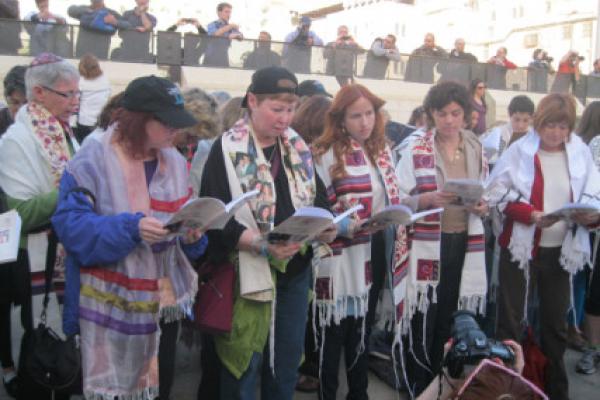(The Controversial figure Rob Bell has created another firestorm with his latest provocative book What We Talk About When We Talk About God. Raven Foundation Education Director, Adam Ericksen and Tripp Hudgins will share our thoughts on the book in this blogalogue. We invite you to join the discussion by leaving a comment.)
Sadly, this is our last post on Rob’s book What We Talk About When We Talk About God. As Tripp Hudgins stated, my previous post was a lengthy missive, and yet I feel like we have just scratched the surface of this book. I promise to make this concluding post shorter, but I’m tempted to inflict upon you the longest post ever! because there is so much in these final 30 pages.
I noticed that we haven’t made a list yet, and every blogalogue needs a list! So, to keep this from becoming the longest post ever!, I offer you the top 3 reason that Rob Bell matters.
JERUSALEM — The ultra-Orthodox rabbi in charge of the sacred Western Wall assured a government emissary on Thursday that Jewish women will not be arrested if they try to recite the mourner’s prayer at the holy site, despite a warning from Israeli police.
Tensions have grown between traditional Jews and reform-minded women over prayers at the Western Wall, which contains the remains of the Temple that was destroyed nearly 2,000 years ago.
Prime Minister Benjamin Netanyahu has tapped Natan Sharansky, chairman of the Jewish Agency, with defusing the conflict and ensuring “that every Jew in the world can pray in the manner that they are accustomed to at Judaism’s most important national and religious site,” according to a statement issued by the Jewish Agency.
Does violence rule our species? The barrage of international conflicts now in the headlines seems to suggest that violence may be the one language we have in common.
Though we all speak it fluently, very few of us learned it in school. We didn’t have to study its “vocabulary” and “grammar rules” – no, it was much easier than that. Humans pick violence up by immersion and so we are all native speakers. From Syria to Korea to Pakistan to Iraq to the U.S., the language of violence is so natural to us that we couldn’t recite one of its “grammar rules."
Sadly, ignorance of language rules does not diminish fluency. The odd thing is that if we stopped to learn the rules governing our fluency in violence, it would actually make us less fluent. Why? Because the rules of violence reveal an unpleasant reality: We don’t use violence; violence uses us.
As Christians around the world gathered for Good Friday and Resurrection Sunday celebrations last weekend, I have reflected a great deal about the connection between the suffering and passion of Christ and the plight of the undocumented in our nation.
This past year, an amazing surge of activity and concern has emerged among believers in general, and evangelicals in particular focused on passing a new immigration policy in our country. This development is quite a surprise and change. In fact, 10 years ago it was almost impossible to find a recognized evangelical leader who was knowledgeable about immigration, let alone one who was willing to speak out on this issue.
At the core of why evangelicals have made such a dramatic change of heart is the reading of Scripture. While it is impossible to ignore that there are 92 references in Scripture where the word, 'ger' is used, speaking about the stranger in our land and our treatment of these individuals, it is not one single verse but the entire revelation of Scripture that points us towards our responsibility to love the most vulnerable people in our society.
Jimmy Carter offered an open letter a few years ago explaining why he divorced himself from the Southern Baptist Convention after six decades as a deacon and Sunday School teacher. Basically, he contended that the SBC continued to legislate gender inequity from the top-down, cherry picking select verses to serve a desired patriarchal end, to which Carter responds:
It was, however, an unavoidable decision when the convention’s leaders, quoting a few carefully selected Bible verses and claiming that Eve was created second to Adam and was responsible for original sin, ordained that women must be “subservient” to their husbands and prohibited from serving as deacons, pastors or chaplains in the military service.
It’s easy, in the daily course of events, to forget how pervasive such judgments against the equality of women really are, especially as we have examples of powerful women in political office and business. But just as having a black President doesn’t solve racial inequities, neither do a handful of high-profile women indicate there isn’t an ongoing struggle for parity among millions of other women without such power.




